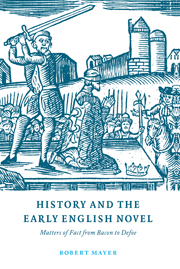Book contents
- Frontmatter
- Contents
- List of illustrations
- Acknowledgments
- Introduction
- 1 Baconian historiography: the contours of historical discourse in seventeenth-century England
- 2 “Idle Trash” or “Reliques of Somthing True”?: the fate of Brut and Arthur and the power of tradition
- 3 The History of Myddle: memory, history, and power
- 4 Lifewriting and historiography, fiction and fact: Baxter, Clarendon, and Hutchinson on the English Civil War
- 5 The secret history of the last Stuart kings
- 6 “Knowing strange things”: historical discourse in the century before Robinson Crusoe
- 7 “History” before Defoe: Nashe, Deloney, Behn, Manley
- 8 Defoe's historical practice: from “The Ages Humble Servant” to Major Alexander Ramkins
- 9 “Facts that are form'd to touch the mind”: Defoe's narratives as forms of historical discourse
- 10 From history to the novel: the reception of Defoe
- Conclusion
- Index
- CAMBRIDGE STUDIES IN EIGHTEENTH-CENTURY ENGLISH LITERATURE AND THOUGHT
5 - The secret history of the last Stuart kings
Published online by Cambridge University Press: 31 October 2009
- Frontmatter
- Contents
- List of illustrations
- Acknowledgments
- Introduction
- 1 Baconian historiography: the contours of historical discourse in seventeenth-century England
- 2 “Idle Trash” or “Reliques of Somthing True”?: the fate of Brut and Arthur and the power of tradition
- 3 The History of Myddle: memory, history, and power
- 4 Lifewriting and historiography, fiction and fact: Baxter, Clarendon, and Hutchinson on the English Civil War
- 5 The secret history of the last Stuart kings
- 6 “Knowing strange things”: historical discourse in the century before Robinson Crusoe
- 7 “History” before Defoe: Nashe, Deloney, Behn, Manley
- 8 Defoe's historical practice: from “The Ages Humble Servant” to Major Alexander Ramkins
- 9 “Facts that are form'd to touch the mind”: Defoe's narratives as forms of historical discourse
- 10 From history to the novel: the reception of Defoe
- Conclusion
- Index
- CAMBRIDGE STUDIES IN EIGHTEENTH-CENTURY ENGLISH LITERATURE AND THOUGHT
Summary
Up to this point in the examination of seventeenth-century historiography, the argument has focused on the debate over the British History, which revealed a surprisingly high tolerance for elements of fiction in historical discourse; on local history, which drew upon gossip and hearsay and functioned as an essay in power; and on histories of the Civil War, which indicated a strong bias in favor of narratives written from the point of view of an engaged individual, so much so that these works have not infrequently been read as works too partial to be regarded as genuine history. In this chapter the focus will be on secret history, where the various features of early modern historiography so far singled out come together. An examination of secret history is crucial to the attempt made in this study to stipulate how late seventeenth- and early eighteenth-century historical discourse functioned as the matrix for the development of the early English novel; the form occupies a position in the discursive terrain where historical and fictional discourse can be viewed in closest conjunction. There were at least three different types of secret history, one that was distinctly historical in character, one that constituted essentially a sustained rhetorical blast, and one that was a fictive form often associated, then and now, with the popular French form, the chronique scandaleuse. Readers were quite capable of sorting out the three different types. The closeness of historical and novelistic discourse at the beginning of the eighteenth century in England should not be taken to indicate that readers were confused about the difference between the two.
- Type
- Chapter
- Information
- History and the Early English NovelMatters of Fact from Bacon to Defoe, pp. 94 - 112Publisher: Cambridge University PressPrint publication year: 1997

